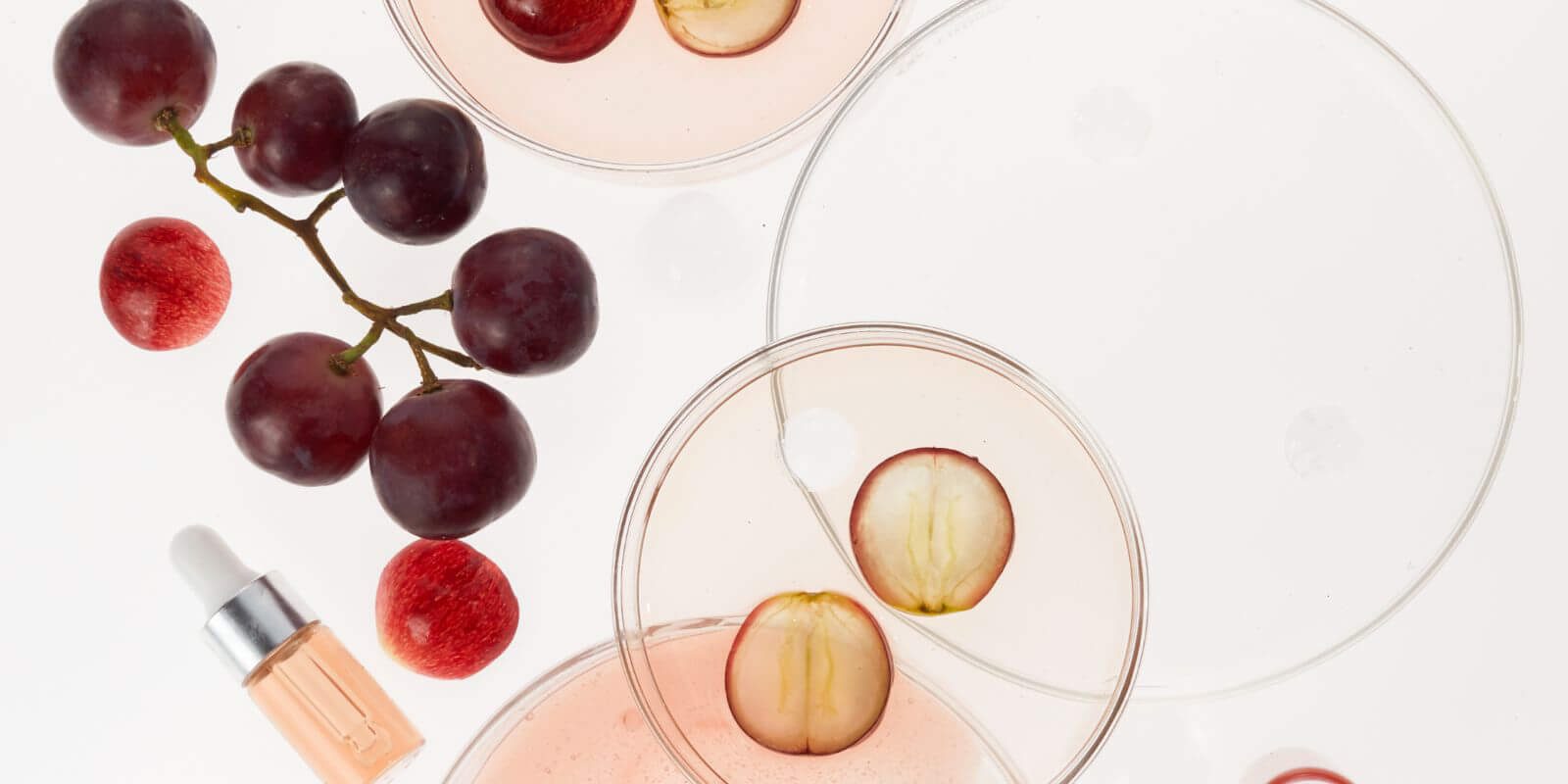“Having antioxidant properties multiple times stronger than those of vitamin C or vitamin E, grape seed and grape skin extracts became well-known for their heart-healthy and anti-cancer properties, but thanks to their other beneficial effects, they also play a role in prevention.
Grape seed extract contains procyanidolic oligomers (PCOs) or proanthocyanidins earlier known as pycnogenols that are important in the prevention of cardiovascular diseases and cancers.
The grape seed contains both water-soluble and fat-soluble components. The grape seed extract penetrates cell walls and exerts its antioxidant effect in the entire body. It is one of the materials that can pass the blood-brain barrier thus protecting even brain cells from the damage caused by free radicals.
The grape seed extract can reduce the threat of heart attacks and strokes, strengthen capillaries, improve the blood flow and ease the numbness of limbs, a symptom of nerve damage occurring as a result of diabetes.
According to a number of studies, the grape seed extract also has anti-cancer properties. Being antioxidants, PCOs protect the genetic material of cells against damages that can play a role in the formation of cancers.
It was proven in this study that the Gere grape seed and grape skin powder contain the antioxidant compounds (quercetin, malvidin, rutin, resveratrol) that are the most important antioxidants of grapes according to scientific literature.
Animal tests clearly confirmed their inhibitive effect on inflammatory processes, including the formation of tumours and their beneficial effect in protecting the heart against damages due to deoxygenation.
Based on all these findings, a regular intake is recommended for prevention purposes. Based on currently available scientific literature, consuming grape seed powder causes no side effects. Intoxication symptoms cannot even be noticed at overdosing.
Although we did not carry out human testing in this survey, we recommend a daily dose of 3-5 g.”
Faculty of Medical Science, University of Pécs
The preparation of the chemical analytic testing, the chemical analytical testing and the preclinical phase testing of the Gere grape seed and grape skin powder.
SUMMARY
HUMAN TESTS OF THE STRESS REDUCTION PROPERTIES OF THE GERE BLUE GRAPE SEED AND SKIN MICRO POWDER
It was proven in a scientific study (The Research Laboratory of the University of Pécs 2012) that the Gere blue grape seed and grape skin powder contains flavonoids and polyphenols (quercetin, resveratrol, malvidin, rutin) that have a strong antioxidant power and thus reduce the cell damage caused by free radicals.
Their animal tests clearly confirmed the inhibition of inflammatory processes in the formation of cardiovascular diseases and tumours after administering the powder. Today’s unfavourable environmental impacts, stressful lifestyle, inappropriate dietary habits, smoking and low level of exercise continuously damage our body. In the background of this damage lays the loss of balance between the generation of a great number of aggressive free radicals and the antioxidant systems responsible for protecting our body and neutralising free radicals. The resulting oxidative stress can cause a number of diseases (autoimmune diseases, diabetes, arteriosclerosis, heart attack, stroke, dementia, Alzheimer’s disease, Parkinson’s disease).
The Oxylab Disease Risk Analysis Laboratory started working in Pécs in 2007 armoured with this important knowledge under the lead of Prof Dr Erzsébet RŐTH, the president of the Hungarian Society for the Research of Free Radicals. They carry out special laboratory tests to specify the level of oxidative stress. They also offer controlled stress treatment.
During their surveys they found that dietary supplements use for antioxidant purposes have a radically different effect in different patients depending primarily on the level of absorption. Therefore, it makes sense to check the effect of the recommended antioxidant with a follow-up 2 months after measuring the baseline because then you can either measure the positive changes (the reduced level of oxidative stress), if any or cannot demonstrate any favourable change because of bad absorption. This is what defines further treatment.
In our human tests, we tested the antioxidant effect of the Villány Gere blue grape seed and skin micro powder on active intellectual and physical workers of different ages (30-50 years). We used internationally validated laboratory tests to assess the efficiency of the antioxidant product. Our test made it possible to measure pro- and antioxidant status, i.e. oxidative stress.
We involved 64 men and women in our survey and defined their oxidative stress levels in the Oxylab specialised laboratory. We found that in 28 (20 women and 8 men) out of the 64 subjects, different levels of oxidative stress were present at the first follow-up. This meant that pathological oxidative processes dominated, while their endogenous oxidant protection was severely reduced.
Based on these results, we selected the 28 people whose oxidative panel showed pathological results and suggested that they regularly take Gere blue grape seed powder 1 coffee spoon a day for 2 months. Then we repeated the laboratory tests for the oxidative stress parameters. We found that the oxidative dominance decreased, and the antioxidant protection became stronger in each subject with no exception. In 17 cases, the values became completely normal, while in 11 cases the oxidative stress became more moderate but was still present. For them, we recommended that they continue taking a higher dose of 2×1 coffee spoon of the powder for another 2 months. In the next follow-up (after 2 months) only 3 patients had higher levels of oxidative stress.
In summary, we can say that in 25 out of 28 patients the values became normal, and the oxidative stress disappeared after regularly taking grape seed powder for 2 or 4 months. For the remaining 3 subjects, we recommended that they continue taking 1 coffee spoon of the powder a day to further reduce their mild oxidative stress.
After the positive results of the in vitro and animal tests known so far, our human tests proved for the first time that the Gere blue grape seed powder has an antioxidant effect and reduces oxidative stress after taking it for as short a period as 2 months. Based on our findings, we recommend taking the Gere blue grape seed powder in all the cases where oxidative stress, a special type of stress that is easy to detect and can be treated in a controlled way with the natural grape seed powder, can be demonstrated with laboratory means.
You can find detailed information about the theoretical background of oxidative stress and the specific surveys at www.oxylab.hu.
A number of articles have been published recently about the positive physiological effects of grape seed. In 2009, an article in Clinical Cancer Research magazine on the activity of polyphenols – one of the active ingredients found in grape seeds – stated that polyphenols killed 76% of leukemic cells cultivated under laboratory conditions.
Dr László MÁRK, the head of the analytic laboratory of the Biochemistry and Medical Chemistry Institute of the University of Pécs – and a participant of the joint research with the GERE Attila Vinery on grape seed and red wines – made the following statement about the findings of the survey on grape seed:
“We have been examining polyphenols in Villány red wine since 2004. These materials protect the cardiovascular system and, as we found out, reduce insulin resistance in type II diabetes. These polyphenols include the famous resveratrol: this molecule was first proven to have positive biomedical effects. These polyphenol components are responsible for the French paradox i.e. the fact that even though they often eat rich food, the risk and the number of cardiovascular diseases is still relatively low among the French. According to research findings, all this can be traced down to their sophisticated red wine drinking habits as polyphenols absorb from the wine and protect your body. The survey of grape seed powder eventually confirmed the same positive effects the polyphenols of wine have.”
Other beneficial components of grape seed are boron, bioflavin, vitamin P, potassium, sodium, calcium, magnesium and some trace elements such as iron, copper, molybdenum and manganese that protect our nervous system together with polyphenols.



